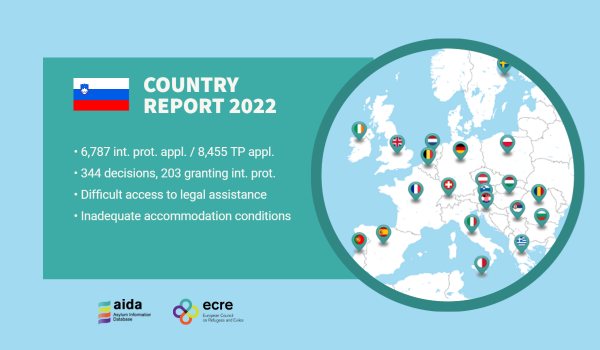The updated AIDA Country Report on Slovenia provides a detailed overview on legislative and practice-related developments in asylum procedures, reception conditions, detention of asylum seekers, content of international protection, as well as procedure for and content of temporary protection in 2022.
In 2022, out of 31,447 expressed intentions to lodge an application for international protection, the authorities recorded only 6,787 lodged applications for international protection, including 1,279 Afghan applicants. Out of 344 in merit decisions, 203 applicants were granted international protection (39 applicants receiving refugee status, 164 applicants receiving subsidiary protection), making for a 59% protection rate at first instance. Out of the 164 subsidiary protections, 158 concerned Ukrainian nationals. Moreover, the administrative court granted subsidiary protection to 4 persons, and further granted 72 appeals sent back to the first instance authority for a new decision, out of 98 total decisions on appeal (78% overturn rate).
Concurrently, in 2022 the Slovene authorities recorded 8,455 applicants for temporary protection, mostly Ukrainian nationals (8,340). Temporary protection was granted to 7,666 persons (including 7,558 Ukrainians) and 85 applications for temporary protection were denied. Ukrainian nationals also submitted 194 applications for international protection; 158 received subsidiary protection. In the first months, there was some backlog at first instance to receive temporary protection status and the associated rights. Overall, the main issues faced by displaced persons from Ukraine was lack of information about the procedure, risks of human trafficking, access to healthcare (limited to emergency care), and the precariousness of private hosting which in some cases required persons to move to State collective accommodation.
Access to the asylum procedure improved in 2022, because of Croatia’s refusal to accept persons back under the bilateral readmission agreement. However, persons continued to be de facto detained before lodging their application and risked detention after lodging the application in case they did not comply with the obligation to remain in the centre before lodging. Despite the high absconding rate, procedures remained very lengthy, with the except of asylum applications by Ukrainian nationals, which were prioritised and processed within a few months; all received subsidiary protection. Lengthiness of proceedings is all the more problematic that an asylum seeker’s freedom of movement during the procedure is limited to the municipality where they live, which can be very small
Access to legal assistance both at first and second instance remained difficult. At first instance, the Migration directorate provided legal counselling only to asylum seekers detected as vulnerable, but there is no systematic vulnerability assessment so only a small group of persons benefited from this programme. Other asylum seekers had to rely on NGO assistance by PIC. Before the administrative court, difficulties in accessing refugee counsellors combined with short time limits to file the application for judicial review resulted in some applicants being unable to exercise their right to legal remedies. Moreover, procedures before the court continued to take a significant amount of time, sometimes years.
Reception capacity continued to be an issue in 2022, leading to overcrowding, particularly with some persons displaced from Ukraine being housed in the same facilities. The Ombudsman visited the Asylum Home and its branch Logatec and delivered worrying conclusions, notably that the accommodation conditions were not in line with the minimal standards of the EUAA. This lack of capacity meant unaccompanied minors continued to be accommodated with adults.
For further information:
- Find comparative information in the Asylum Information Database (AIDA) managed by ECRE

